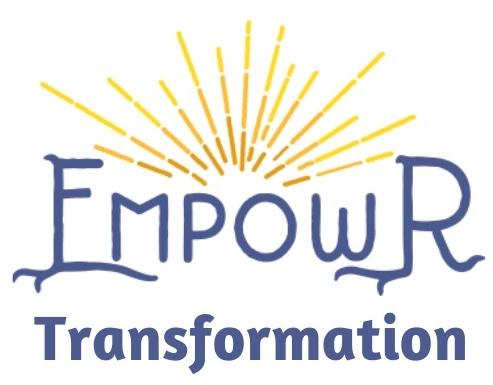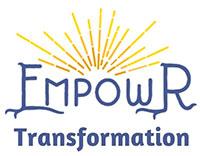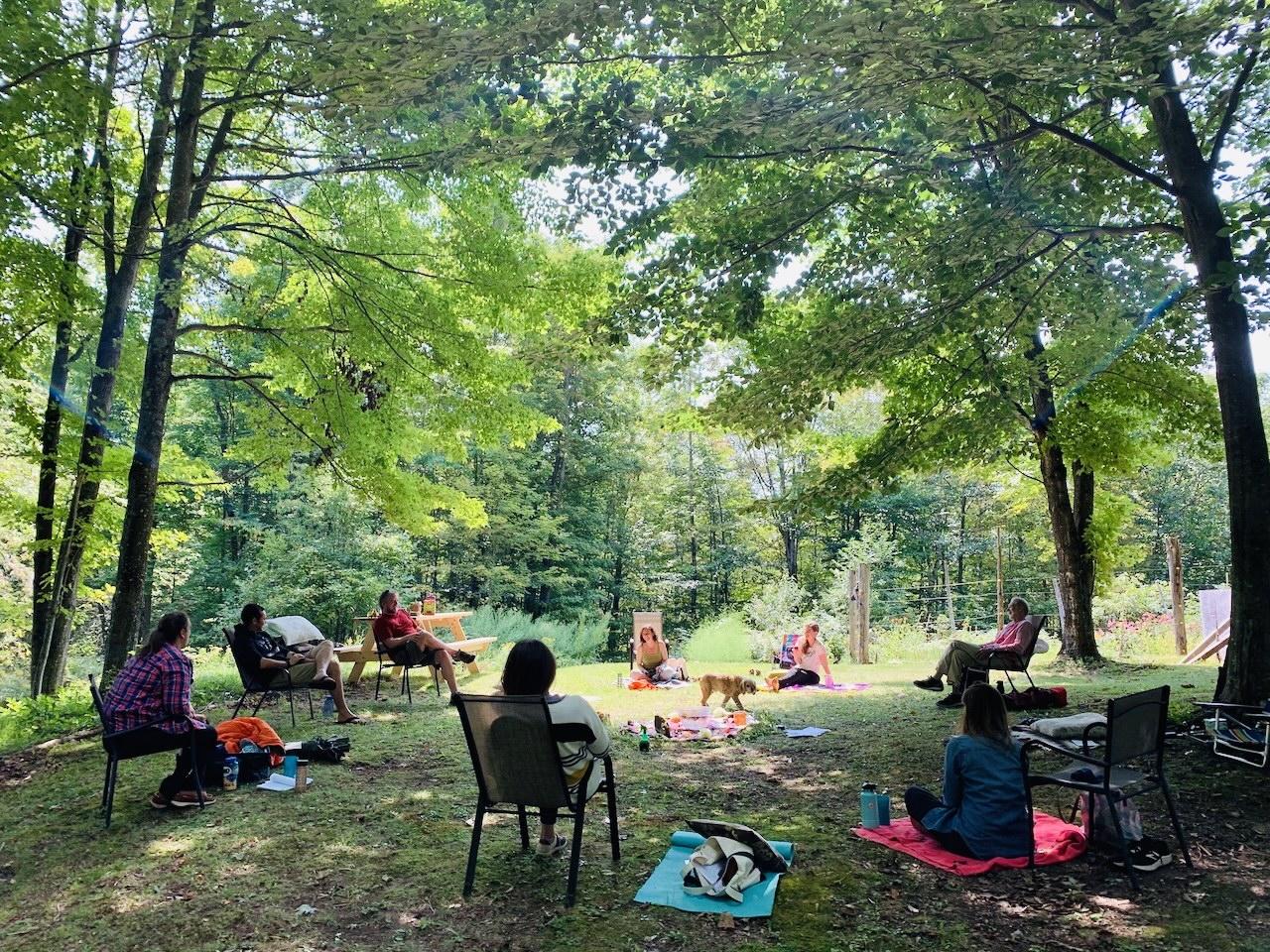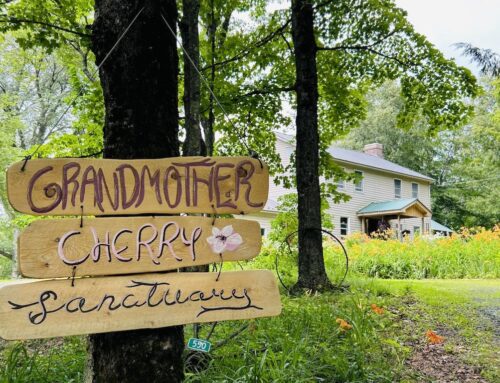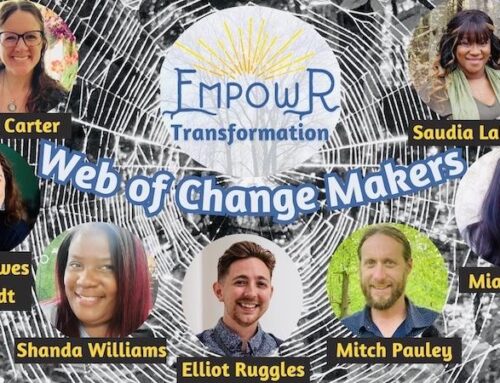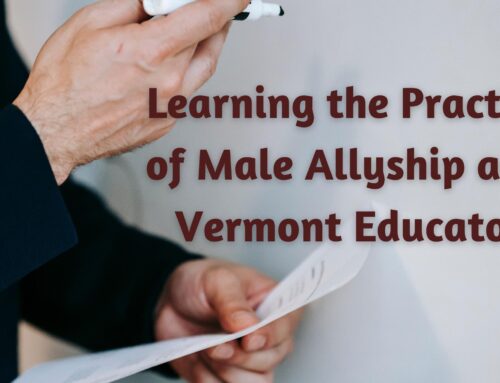While the pandemic found most meetings on Zoom, we got creative here at EmpowR with being able to safely hold outside retreats, in the open air and under the trees at Grandmother Cherry Sanctuary in Plainfield, Vermont.
In the waning days of summer, members of the Let’s Grow Kids team came together for a day to practice embodied equity to support daily engagement in anti-racism and anti-oppression. EmpowR facilitated a retreat to support co-creating organizational culture that integrates personal responsibility and group communication into Let’s Grow Kids commitments to inclusion and anti-racism in their movement work to ensure affordable access to high-quality child care for all Vermont families by 2025.
EmpowR framed the day around the experience of embodying anti-racist culture in a nature-based learning environment conducive of multi-sensory awareness that invites perspective shifts.
Intentions for the retreat are foundational to integrating equity and inclusion in group process, organizational communication, and movement building work:
-
Center cultivating authentic relationships
-
Build trust and encourage vulnerability
-
Practice equitable communication and invite shared learning
-
Develop skills for uncomfortable conversations and energetically stressful situations
Premise and Framework for Cultivating Culture Change
The culture of white supremacy and the toxicity of racism lives within the body and is intellectualized by our brains. Approaching equity work through the lens of taking responsibility for our behavior shines a light on the depth of complexity in complicity, especially in white and white-passing bodies. The premise of the retreat was partially guided by cultural somatics and somatic abolitionism approaches taught by Resmaa Menakem, author of My Grandmother’s Hands and The Quaking of America, in his teachings in the Racialized Trauma programs at the Cultural Somatics Institute and the Education for Racial Equity program, both of which EmpowR facilitator, Rae Carter, has been deeply engaged in for a couple of years.
White identifying people can work towards creating a culture that is safe and disengages from the characteristics of white supremacy culture as thoroughly explained by Tema Okun’s work, Divorcing from White Supremacy Culture. This work begins with holding ourselves accountable for how we cause individual and collective harm and understanding that culture is informed by the behaviors that, over time become norms. By entering into culture change work with recognition of how our personal behaviors contribute to the collective, we begin to realize that we are each responsible for affecting meaningful change.
Terminology and Concepts
Spaciousness was a priority for the day and rather than lay out an agenda, the group was encouraged to trust in the flow and let go of expectations.
The retreat was planned for a time when participants had been undergoing their own personal and organizational education in anti-racism and equity work, so everyone arrived at an opening entry point that was aligned to deepen into the work together. Facilitation guided everyone through some of the following terminology:
- Embodiment: The wholeness of our experience which includes our mind and thoughts, emotions and feelings, physical body and anatomy, spiritual beliefs and awareness of consciousness/higher self. It is through an integration process of our whole selves that can awaken a more in depth understanding of what influences our behavior.
- Culture: Shaped by our words, actions, behaviors, interpersonal communications, and traumas of people and groups. Culture is a container and all of its contents whether it be a community, family, social group, organization, state, country, etc.
- White Supremacy: The dominant culture of the United States and an often unconscious and unspoken ideology that white people and the ideas, thoughts, beliefs, actions, and bodies of white people are superior to Brown and Black people, and their communities, ideas, thoughts, beliefs, and actions. Much of white supremacy is expressed in how dominant culture operates, as defined by the characteristics of white supremacy culture in the decades long work of Tema Okun and racial justice activists and educators.
- Racism: When the power and wealth controlling elite of white people has the unchallenged ability to carry out systemic discrimination, marginalization, and oppression through the institutional policies and practices of society while shaping cultural beliefs and values that support those racist policies and practices.
- Expressions of Racism: Personal (individual behaviors and the lack of accountability to where we cause harm), cultural (collective beliefs, values, and norms which are dominated by the culture of white supremacy), and institutional (the policies, structures, and systems that perpetuate racism).
- Wheel of Change: A concept developed by Robert Gass and presented by Rockwood Leadership Institute’s Art of Navigating Change program, attended by EmpowR facilitator, Rae Carter. The Wheel of Change model communicates how embodying a transformative justice approach to racism and oppression begins with changing our hearts and minds (thoughts, perspectives, responses to feelings and emotions) and understanding and experiencing how they influence our behavior (words, actions, communications) which then informs institutional structures. In other words, changing institutional structures and systems begins with the people who comprise them.
- Transformative Justice:
- transform ourselves to transform the world (Grace Lee Boggs);
- practices that go all the way to the root cause of the problem and generate solutions and healing there, such that the conditions that create injustice are transformed (adrienne maree brown);
- transform the conditions that enable harm, while facilitating repair for the harm by cultivating accountability, healing, resilience and safety for all (Mia Mingus);
- heal yourself to heal the world (you must be the change you want to see in the world – Mahatma Gandhi)
- approach to conversations, practices, and shared learning that generate healing and solutions at the root of complex issues to transform the conditions that cause personal and cultural harm, suffering, and injustice (language EmpowR uses in holding ourselves accountable to our mission)
- Emergent Strategy (adrienne maree brown):
- approaching change through relatively small, repetitive interactions to build more complex patterns and systems
- collaboration rooted in love and humility that relies on the strength of relationships for adaptability
- intentionally changing in ways that grow our capacity to embody the just and liberated worlds we long for
Terminology was presented early in the retreat and the concepts were woven in throughout the day, visualized by an altar set in the center of the circle. Facilitation guided the Let’s Grow Kids team back to the concepts represented in the center of the circle to support embodying learning through many different types of intelligences.
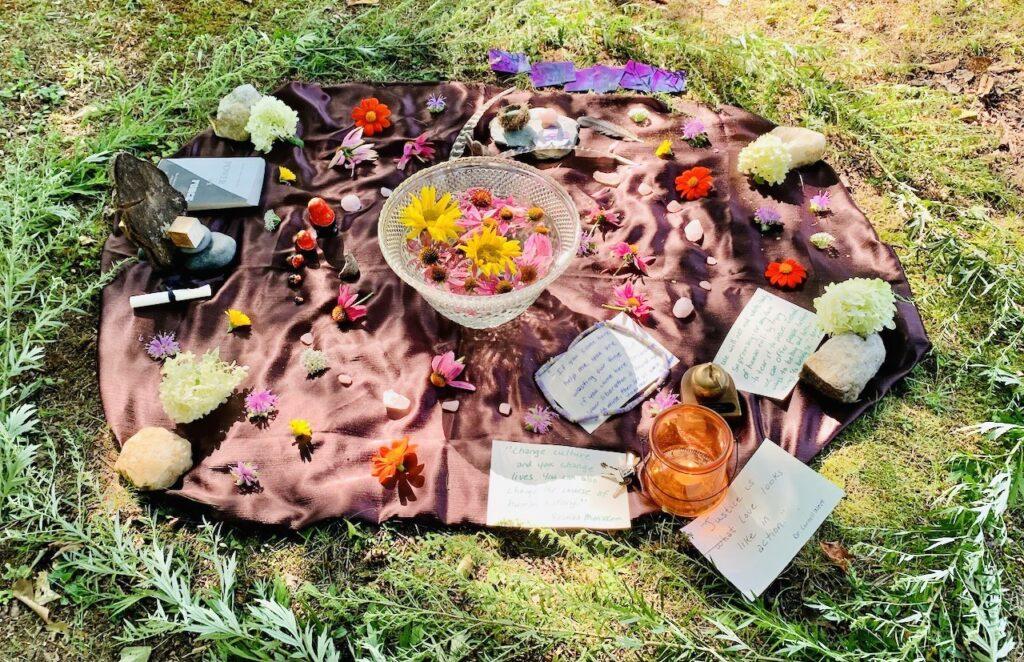
Retreat Experience
We began the day sitting on the ground in circle, with pillows, blankets, and mats to support our bodies on the Earth. A canopy of beautiful trees and playful mountain air awakened our senses and invoked a sense of calm as we breathed, listened, and grounded into the present space and time. Everyone had the chance to share how they were feeling, creating the opportunity for relationship nourishment through vulnerability right away.
Most participants had never experienced sharing and learning in circle before and the combination of collaborating with nature was a powerful experience for everyone. We circled back around to the premise, terminology, and concepts through full group circle dialogue, embodiment and mindfulness practices, journaling and reflection time, and small group dialogues that took place by walking in the woods and deep listening to one another with awareness of different intelligences in nature.
Ample time and space was provided for lunch and nourishment of the body, returning to embracing the energy of spaciousness and reevaluating our relationship with time and its implications in equity and inclusion work.
We returned from lunch refreshed and nourished to develop embodiment skills for handling uncomfortable conversations and energetically stressful situations the participants often encounter in their work as it relates to race, class, ability, power structures, community engagement, and organizational communication.
By this point in the day, a generative shift was taking place as the Let’s Grow Kids team began to actualize for themselves why and how personal equity work translates into the integration of equity work in movement building.
For an in depth and spacious conclusion, we took an accountability walk through the sanctuary forest where each participant named a personal responsibility commitment. We gathered together for a closing circle in the woods where everyone named how to bring accountability and shared learning from the retreat back to the organization.
And before we closed the circle, we sang together songs of gratitude to the trees.
A month later EmpowR facilitated a co-creation process with participants to share their learning of how to integrate deeper equity commitments into Let’s Grow Kids culture as a collective and unified team voice.
Feedback from Let’s Grow Kids
Here are some words shared about the retreat experience by different Let’s Grow Kids team members who attended the retreat.
At Let’s Grow Kids our work is to make connections with people and empower them to make change. Attending the Equity Integration Retreat hosted by EmpowR supported us to look more broadly at how our personal growth and cultural actions can support our work towards systems change.
Getting out of the traditional office/work setting by gathering outside in a new space, was inspiring, refreshing and revitalizing.
This was a very powerful way to help our team breakout of the confines of what we “usually” talk about and to get to know each other at a deeper level.
EmpowR offered us powerful exercises in equitable listening, nervous system awareness, circle sharing, and much more. Together we created space for personal accountability and risk-taking. We will continue to reflect on all that was learned and return to the commitments made.
Being together in person on the land was great and intimidating for a person who was new on the team. I am grateful that the opportunity to do a deep dive and get to know my co-workers was facilitated well.
Facilitation was an effortless move from item to item and the flow of the day from walks in the woods, to lunch, to group conversations, shared learning, and even a bee sting was amazing.
Facilitation allowed for connection and ease and the ability to dig deeper with a group of people from all different backgrounds who come to work from different places.
I really appreciated the emphasis on process – especially after a year on zoom, re-connecting with people and with nature supported my personal growth.
Powerful exercise in listening. Leaving behind internal dialogue and just listening is a key takeaway for me.
Getting out of a traditional office/work setting was great.
Humming together was very cool and not something I would expect to do with co-workers. It was a different, non traditional, way of connecting with the people around me. Singing together usually happens in a social context and builds community and connection in a different way. I am grateful we had the opportunity to connect in this way in a professional development setting.
One of the things that makes me the most uncomfortable is to be sung to or sung at, but this did not feel uncomfortable. Throughout the day I was happily surprised by the comfort and connection that was developing in our group. I was encouraged to be intentional about touching the ground. The tactile connection with nature stimulated different parts of my personal system and got me out of the intellectual and into sensory experiences at multiple levels. It’s amazing how much this supported my understanding of dismantling white supremacy from an embodied place.
Acknowledgement of the land, specifically the encouraged connection to the land (not the people that use or abuse the land) helped set the tone of the day.
Working on the skill of listening and re-learning how to be listened to was extremely valuable. Grandmother Cherry Sanctuary is a gorgeous location and Rae was extremely generous with the space.
Spending time outdoors, away from screens and distractions, allowed me to connect with myself and my colleagues in a deeper and much more meaningful way than I do on an ordinary workday. Rae’s facilitation of our time together was encouraging and empowering. She modeled vulnerability, openness, and compassion in her storytelling and sharing, which inspired me to do the same. While I knew she had so much to teach us, I also felt seen, heard, respected, and valued for my contributions. I appreciate the opportunities Rae created for personal accountability and risk-taking. I felt rested, revitalized, and inspired at the end of the day and I am so grateful for the time I spent with Rae. Since our retreat, I have continued to reflect on what I learned and return to the commitments I made to create culture change.
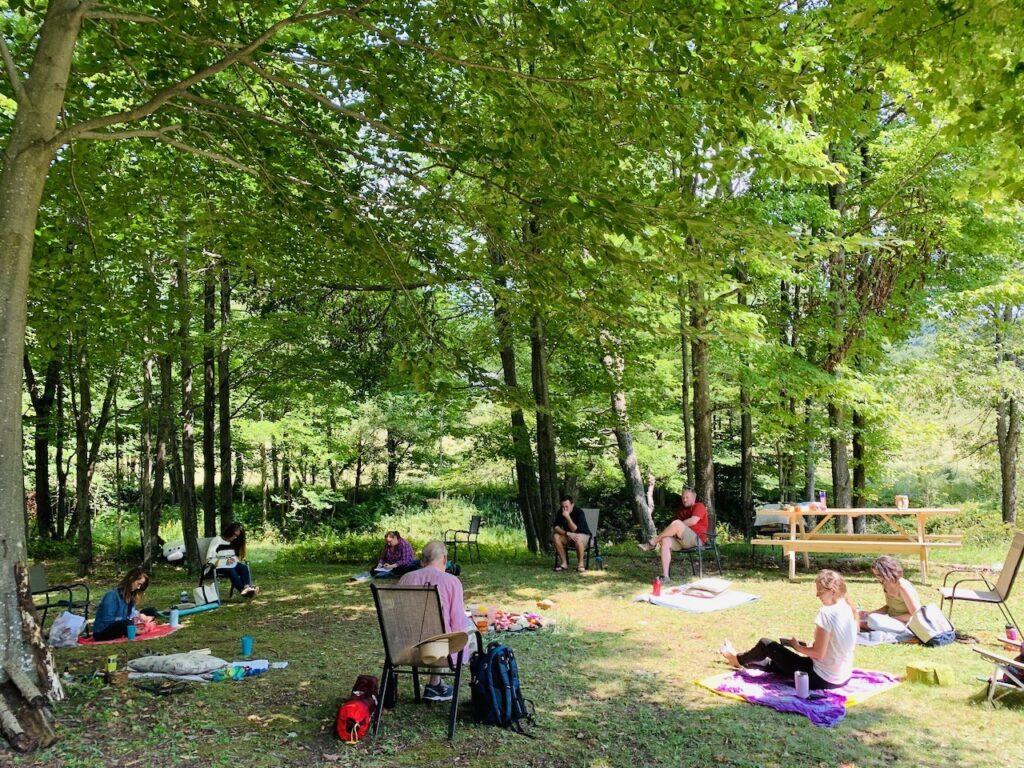
About Let’s Grow Kids
Let’s Grow Kids is a statewide movement to make Vermont the best place to raise a family and our mission is to ensure affordable access to high-quality child care for all Vermont families by 2025. Let’s Grow Kids works with business, education and health care leaders, elected officials and local communities to build a high-quality child care system and a network of over thirty thousand supporters includes dedicated volunteers who advocate for increased public investment in child care to make it affordable for Vermont families. Learn more at LetsGrowKids.org.
About EmpowR
EmpowR’s mission is co-creating cultures of empathy, healing, community, and accountability centered in equity and belonging. Personal support sessions, professional development, dialogue facilitation and conversation design, change management consulting services, educational programs, and community events are designed to empower holistic wellness, cultivate healthy communication, and build compassionate, anti-racist culture. EmpowR works with individuals, groups, teams, organizations, businesses, and institutions who are navigating the complexities of change. As a container accountable to transformative justice and emergent strategy, EmpowR facilitates culture change; community building; interpersonal, group, and organizational dialogue; social and emotional healing; and new ways of being in relationship with our bodies, each other, and the Earth.
Learn more about working with EmpowR to co-create an equity integration retreat for your organization.
